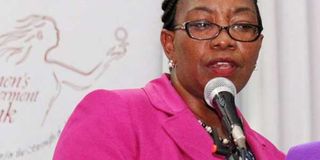Expand space to tap women’s potential

Health CS nominee Sicily Kariuki. It is comforting that the Health docket is now headed by Ms Kariuki, who, as a woman, is acutely aware of these challenges. FILE PHOTO | NATION MEDIA GROUP
What you need to know:
The introduction of free maternity care and access to the National Hospital Insurance Fund for new mothers, are commendable.
Access to adequate housing is a fundamental human right.
By investing more in women and empowering and increasing their freedoms, the gains will accrue to the whole society.
There is a need to pay attention to women’s specific needs and priorities. Their right to the highest attainable standards of physical and mental health and access to affordable and adequate health care, including sexual, reproductive and maternal services and life-saving obstetric care, is crucial.
Lack of economic empowerment and independence has increased women’s vulnerability to a range of negative consequences, including the risk of contracting HIV/Aids, malaria, tuberculosis and other poverty-related diseases. The introduction of free maternity care and access to the National Hospital Insurance Fund for new mothers, are commendable, though this needs to cover all aspects of health care for women and their families.
This ranges from curbing low birth weight and prematurity, and childhood nutrition and immunisation, to prevention and treatment for chronic conditions such as heart and lung disease, mental health disorders, diabetes, and breast and cervical cancers.
It is, however, comforting that the Health docket is now headed by Ms Sicily Kariuki, who, as a woman, is acutely aware of these challenges.
Access to adequate housing is a fundamental human right.
“Within the overall context of an enabling approach,” states Paragraph 61 of the Habitat Agenda, “governments should take appropriate action in order to promote, protect and ensure the full and progressive realisation of the right to adequate housing.”
It is necessary to have a gender perspective as it is a fact that women, as wives and mothers, are primary users of the space both in their homes and communities.
Since women participate less in decision making and have less access to assets and resources, they also have less access to land and housing. Low-income single women and women-headed households are often even more restricted in their access to housing. Women should be given land tenure rights to gain access to credit.
Affordable housing can only be achieved if discriminatory cultural constraints are removed. There is a need to increase the participation of women in the manufacturing sector as part of the drive to industrialise for a stable and sustainable economic future.
STEREOTYPES
Education choices, cultural stereotypes, lack of awareness and role models are handicaps. Industrialisation Cabinet Secretary Adan Mohamed should go the extra mile to ensure that women have access to resources and industries to create employment.
Gender equality can also contribute to food security. Customary practices often limit women’s access to key resources such as land and credit, adversely affecting household food security and nutrition. Rural women and men guarantee food security for their households and communities.
While men grow mainly field crops, women are responsible for growing and preparing food and raising small livestock.
There is a need to address women’s unequal access to land, livestock, labour, education, extension, financial services, and technology, which has led to a significant gender yield gap.
Women are more likely to adopt new techniques in farming to enhance household nutrition.
By investing more in women and empowering and increasing their freedoms, the gains will accrue to the whole society.
The government urgently needs the full potential of women’s contributions, but this can only materialise with wider recognition and acknowledgment benefits to society, and the importance of reshaping social structures. This will impact on women and girls who form half of the population. With political goodwill this will be possible.
Ms Mohamed is a gender and governance expert. [email protected]




